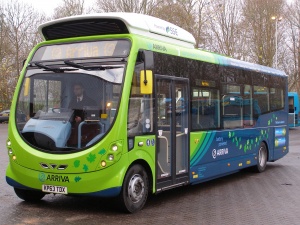Milton Keynes welcomes first electric buses

Minister of state for transport Baroness Kramer has officially launched an all-electric bus route that will test whether electric buses can perform on a par with their diesel counterparts in a real-world operational environment.
The buses will run for five years in the new town of Milton Keynes as part of a carefully monitored demonstration programme, which will objectively assess their technical and commercial viability.
Eight electric buses will take over a route that even diesel buses find demanding: running 17 hours a day, seven days a week, with each bus covering over 56,000 miles per year.
However, the Milton Keynes buses have a special technological advantage to help them meet the rigours of their route: wireless charging.
Instead of plugging into the mains, the new buses will be able to recharge their batteries wirelessly during their working day.
This means they can run a continuous service for a whole 17 hours, just like a diesel bus.
The concept is simple: wireless charging plates set into the road transfer power directly to receiving plates underneath the bus, using a technique based on the principles of electrical induction.
In just ten minutes, a bus parked over a charging point will replenish two-thirds of the energy consumed on its 15-mile route.
Only two wireless charging points are needed to service all eight buses, which will charge in the time scheduled for driver breaks.
The eight electric buses have important environmental benefits: they will remove approximately five tonnes of particulates and noxious tailpipe emissions from the city’s streets each year and approximately 270 tonnes of CO2 per year from the atmosphere.
As the UK electricity supply becomes greener in future years, the CO2 savings from the continuing operation of electric buses on this route could increase to more than 680 tonnes per year.
The trial is an innovative free-market collaboration between forward-thinking organisations, led by eFleet Integrated Service, an enabling company set up by Mitsui & Co. Europe and design engineering consultancy Arup.
The trial, supported by Milton Keynes Borough Council and the department for transport, aims to prove that low-carbon transport can be a cost-effective and efficient alternative to traditional diesel and petrol vehicles.
Kramer said: “I am delighted to be here in Milton Keynes today at the launch of the first electric wirelessly-charged buses in the UK.
“These ultra-low emission buses will offer the travelling public a quieter, smoother journey as well as cutting carbon and improving air quality.
“This project represents a fantastic opportunity to learn more about extending the future capability and rollout of electric buses.”
The ultimate aim of eFIS is to use the data collected by the Milton Keynes trial to demonstrate the technical and economic viability of low-carbon public transport.
This data could be used to kick-start electric bus projects in other towns and cities worldwide.
The new timetable will be implemented on January 19th 2014.

